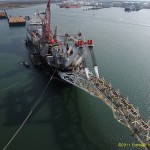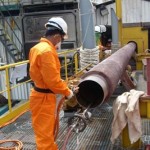 In today’s society, news headlines are fixated on the price of oil and gas, as overseas negotiations and an ongoing battle in the Middle East continue to affect the perception of this vital commodity. However, behind the scenes – there are plenty of employees who make decisions, transport the oil, and facilitate business deals for the United States. When looking to learn more about the careers centered on oil and gas, consider the following employment possibilities:
In today’s society, news headlines are fixated on the price of oil and gas, as overseas negotiations and an ongoing battle in the Middle East continue to affect the perception of this vital commodity. However, behind the scenes – there are plenty of employees who make decisions, transport the oil, and facilitate business deals for the United States. When looking to learn more about the careers centered on oil and gas, consider the following employment possibilities:
Exploration Manager
Discovering vital oil and gas deposits is a valuable job in this day and age that will only continue to increase in importance as resources become scarcer. An exploration manager leads and operates the expeditions to discover more oil and gas. While evaluating the possibilities and value of a potential site, knowledge of federal, state, and local regulations is a must. A bachelor’s degree (and preferably a master’s degree) is required in this field. Those with eight to 10 years of experience are most likely chosen for this position. The average yearly salary for this career choice is between $157,665 and $208,954.
Oilwell Pumper
While you are quite familiar with the employee who may pump your gas at a service station, have you ever stopped to think how oil is manufactured? An oilwell pumper is responsible for the daily maintenance and care of oil wells. They operate the injection equipment and oversee oil production – making sure to keep in line with standard operating procedures. This kind of pumper will keep reports and make assessments of the volume and pressure of gas and oil contained inside of a well. A high school diploma or its equivalent is needed for consideration. Zero to two years of experience within the field is suggested, as you should display a familiarity regarding the concepts, practices, and procedures within this particular field. Usually, a supervisor or manager manages their progress and projects. The typical salary for this job is between $35,348 and $57,176.
Pipeline Engineer
A pipeline engineer may work with natural and/or liquid gases – heading projects; working with operations and marketing; selecting pipeline routes; reviewing construction sketches; conducting financial tracking and reporting; and provide technical training to other members of the staff. The ideal candidate for this type of position has five to 15 years of experience in transmission size pipeline engineering, and a bachelor’s degree in engineering. Preference is usually given to those with a PE certification. The salary for this job varies. For instance, in Texas – you can expect to earn up to $105,000, which is usually contingent upon the amount of experience you possess.
Gas Supply Manager
As a gas supply manager, you are responsible for getting a hold of the required supplies of gas for various companies. Contract negotiation with acceptable sources become a major part of this job, as well as making sure that all conditions are fulfilled. You will oversee the appropriate transport and storage of these gas supplies. Over time, you will create a working relationship with suppliers. A bachelor’s degree is required for this position – coupled with at least 10 years of experience in the field. Experience in a related area is also accepted. The average yearly salary for a gas supply manager is found between $89,001 and $136,754.
Rate Analyst
Energy operational costs are the focus of this particular job, which has employees analyzing the gathering and transporting rates for gas. Having knowledge of Federal Energy Regulatory Commission policies is a must with this career. Most often, an advanced degree within an area of specialty is expected. The majority of rate analysts have four to six years of experience in the field already under their belt. A variety of different tasks are expected of this job position, which typically earns between $61,482 and $78,854.
Electric and Gas Operations Superintendent
As an electric and gas operations superintendent, your responsibility is to oversee the work crews in charge of constructing, maintaining, and repairing systems associated with electricity and gas. A superintendent creates plans and watches over the process of their employees by managing crew supervisors. A bachelor’s degree is sometimes required for this position, as well as at least eight years of experience within the field. The job also centers on a variety of various concepts, practices, and procedures. In this particular career path, extensive experience and judgment truly come in handy when planning and setting goals. Of course, a superintendent is expected to lead and guide the work of other employees. The earning potential for this job is between $71,607 and $106,982.
College Courses
To get an idea of the potential college courses associated with a career in oil and gas – you may face Oil & Gas Field Operations, Hydrocarbons, Oil Field Production, Oil Field Processing, intense labs, field experience, and testing on wastewater treatment, crude oil handling, artificial lift systems, and drilling techniques.








